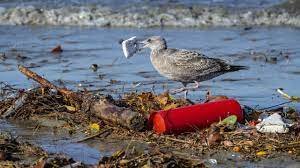
KEY POINTS
Approximately 170 trillion pieces of plastic are floating on the surface of the world’s oceans.
Plastic pollution has harmful effects on marine animals and humans who ingest it.
Recycling, even in countries with advanced waste management systems, has done little to help the pollution problem.
Plastic pollution in the world’s oceans has reached “unprecedented levels” over the past 15 years, a new study has found, calling for a legally binding international treaty to stop the harmful waste.
Ocean plastic pollution is a persistent problem around the globe where animals may become entangled in larger pieces of plastic like fishing nets, or ingest microplastics that eventually enter the food chain to be consumed by humans.
Research published on Wednesday found that there are an estimated 170 trillion pieces of plastic, mainly microplastics, on the surface of the world’s oceans today, much of it discarded since 2005.
